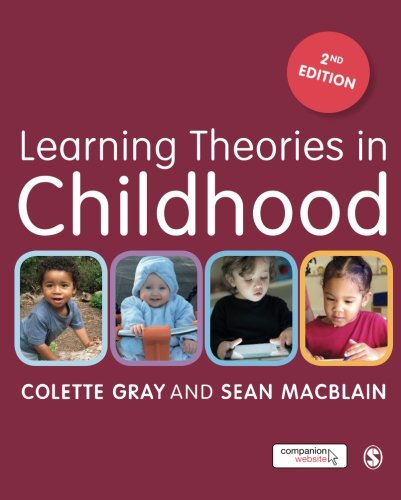Top 8 social learning theory bandura
If you looking for social learning theory bandura then you are right place. We are searching for the best social learning theory bandura on the market and analyze these products to provide you the best choice.
Best social learning theory bandura
1. Social Learning Theory
Description
| An exploration of contemporary advances in social learning theory with special emphasis on the important roles played by cognitive, vicarious, and self-regulatory processes. |
2. Model-directed Learning. Albert Bandura's Social Cognitive Learning Theory and its Social-psychological Significance for School and Instruction
Description
Seminar paper from the year 2006 in the subject Pedagogy - Science, Theory, Anthropology, grade: 1,7, University of Wuppertal, course: Theory of Learning, language: English, abstract: This term paper explores the subject Model-directed Learning, Albert Bandura's Social Cognitive Learning Theory and its social-psychological Significance for School and Instruction". The topic touches on several complex scientific areas that cannot be exhaustively discussed and in part can only contribute in a more generalized form to the scope of this term paper. Hence, there is the challenge of setting boundaries at first. The main focus of this paper is on the social cognitive learning theory according to Albert Bandura, with its central statements serving as the theoretical foundation of the paper as a whole. The aim is to investigate, which basic principles Bandura is adopting from human behavior, how he does explain and analyze this approach. This theoretical rationale should be set up in the socio-psychological context of school and instruction. Hence, a main goal of this paper is to establish a theory-practice relevance. In other words, the focus is to investigate which consequences are arising from the social cognitive learning theory for school, teaching, education, and studying. A key aspect of the social cognitive learning theory is model-based learning, thus, the assumption that human learning can happen through observation and imitation of others. In a society, in which humans strive for individuality and originality, imitation and simulation are associated with negative characteristics. Nevertheless, imitation behavior plays an important role even in every day situations. A person's aggressive behavior or drug habit is often rationalized with the assumption that this behavior was copied from friends, or was due to the influence of others, or being surrounded with the wrong people. This term paper attempts to show the scientific reasoning behind this "everyday wisdom",3. Social Learning Theory by Albert Bandura (1976-11-11)
4. Aggression: A Social Learning Analysis (The Prentice-Hall Series in Social Learning Theory)
Description
This book is concerned with why people engage in aggressive behavior. Theories of human behavior have changed over the years, as interest in approaches that depict behavior as instinctively determined or impelled by drive forces have declined as deficiencies became apparent. Perspectives based on social learning have emerged that increase our understanding of human behavior.In this book, the author has attempted to formulate a social learning theory of aggression, whether individual or collective, personal or institutional sanctioned. The goal is to improve the basis on which we explain, predict, and modify aggression.
A sizable portion of this book is devoted to demonstrating how social learning principles can be applied individually and at the social systems level to reduce deleterious forms of aggression. The use of social power as an instrument of change is also addressed. There is a discussion of social labeling and ethics of aggressive action.
5. Social Foundations of Thought and Action: A Social Cognitive Theory
Description
| Presents a comprehensive theory of human motivation and action from a social-cognitive perspective. This insightful text addresses the prominent roles played by cognitive, vicarious, self-regulatory, and self-reflective processes in psychosocial functioning; emphasizes reciprocal causation through the interplay of cognitive, behavioral, and environmental factors; and systematically applies the basic principles of this theory to personal and social change. |
6. Social Learning Theory (Chinese Edition)
Description
Breaking out the traditional framework of behaviourism, Social Learning Theory treats social learning from the perspective of combination of cognition and behavior. The book shows that the writer tries to walk a way quite different from traditional behaviorism and cognitive psychology and to be a new-behaviorist .7. Learning Theories in Childhood
Feature
Sage Publications LtdDescription
Focusing on the early philosophies of learning and key behavioural, cognitive, and social theorists, including Locke, Rousseau, Montessori, Piaget, Vygotsky, Bandura, Bronfenbrenner & Bruner, this popular book provides a comprehensive overview of childrens learning. The authors highlight the strengths and weaknesses of each theoretical perspective, and encourage reflection on how different approaches impact on the learning environment. The discussion finishes with an exploration of the new sociology of childhood.
New to this Second Edition are:
a new chapter on What is theory and what is learning?
a new chapter on The Changing nature of learning
There is also a new companion website which features:
journal articles to read alongside each chapter
podcasts from the authors explaining the key points on each topic
links to video material discussing key theories and methods.
You can access the books online materials at study.sagepub.com/grayandmacblain2e
Accessibly written, with key questions and recommended reading included, this book is essential for all those studying on child development, early childhood and childhood studies courses, and for anyone interested in understanding more about how children learn and think.
Colette Gray is Head of Research Development and Principal Lecturer in Childhood Studies at Stanmillis University College, Belfast, and Sean MacBlain is Reader in Child Development and Disability at the University of St. Mark & St. John, Plymouth.
For access to the website8. Theories of Human Development: Integrative Perspectives











Recent Comments